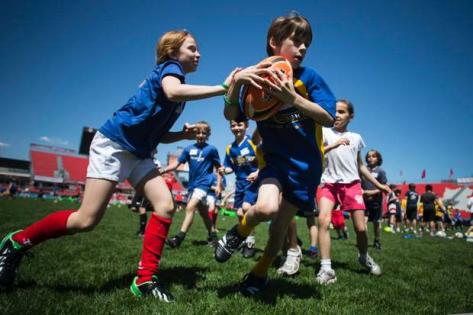Around 400 school children from years 6 -12 will participate in what is believed to be the first school-based concussion management program in Australia.
The project, led by Southern Cross University psychology researcher Dr Jim Donnelly in partnership with The Armidale School (TAS), will offer internet-based testing to set a baseline for students that will inform the management of any future concussion suffered.
Dr Donnelly, from the University's School of Health and Human Sciences, is a neuropsychology researcher who has been investigating the impact of mild traumatic brain injury, or concussion, in children and adults for many years. He says there is very good evidence to suggest that cumulative concussions increased the risk for emotional, behavioural and academic problems in children and also dementia later in life.
But Dr Donnelly says there is also a culture in many sports which may still encourage children and adults to continue playing even after suffering a head injury.
"Only about 10% of concussions result in a complete loss of consciousness. Concussion is any altered state of consciousness, from momentarily feeling slightly dizzy or disorientated, losing your sense of balance to getting knocked out," Dr Donnelly said.
"If a child or teenager is concussed they need to come off the field and stay off until they are properly assessed.
"Ideally, we would like to have pre-injury baseline testing for each child, so if a concussion does occur we can compare individual post-injury performance to pre-injury test scores and symptoms."
At TAS, a boarding and day-school in northern NSW, every child, not just athletes, will undertake baseline testing using a series of brief online tests, developed by Axon Sports. The tests measure reaction time, attention and memory, and a symptom checklist recommended by international experts will be used to note other concussion effects.
Headmaster Murray Guest said TAS had worked with Dr Donnelly on developing concussion management protocols and the school was proud to be a leader in the field at a time of growing international interest.
"Sport is intrinsically valuable for physical, social and mental development. However, with that comes a very real responsibility to ensure the risks of long term damage are minimised. This baseline testing will not only inform our own management of concussion but also provide a model that will hopefully be followed by others," he said.
Dr Donnelly said by knowing a person's reaction times prior to concussion, the progress of their recovery could be better assessed.
"Some people can recover very quickly, but at least 20% of kids still have symptoms of concussion after three months.
"People will often understate their symptoms because they are eager to get back to their sport, and they don't want to be seen to be letting the team down.
"There is a very strong culture that people should 'play hard and even play hurt'. Kids, teenagers and parents see these scenes repeatedly on television and that makes it very difficult to think differently.
"We need to start talking about this as a brain injury, not just a minor bump on the head, to keep it alive in people's minds that this is a serious condition."
Dr Donnelly said the project in Armidale relied heavily on the enthusiastic efforts of the school's Headmaster, clinical nursing sister, IT staff, coaches, parents and the students.
Local GP Dr Luke Bookallil is providing clinical oversight, while the online testing program also allows for a new link to a clinical neuropsychologist.
"We are submitting an application to the National Health and Medical Research Council to get funding to provide this program to other rural and regional schools and to inform a 'Return to Play' management policy," Dr Donnelly said.
Earlier this year, the CEO of Alzheimer's Australia NSW, John Watkins, warned of a growing body of research and anecdotal evidence linking concussion and other head injuries in the football codes to cognitive impairment in later life.
"The codes have a responsibility to their players to undertake more research in this area, particularly with retired footballers, to see if there is evidence of post-career cognitive impairment, and even the development of dementia, as a result of multiple concussions sustained during their careers."
An online resource is available to help parents and sports officials recognise the signs of concussion in children.


















__small.png)










